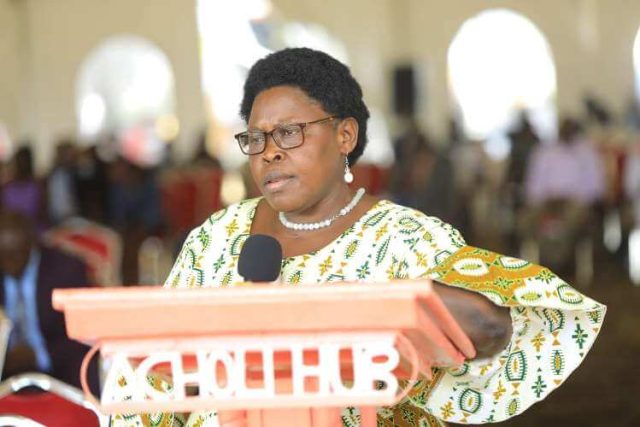GULU– Parliament has learnt Government took the decision to halt the implementation of the free compulsory education in Uganda, and instead have the focus put on the preparation for the 2027 Africa Cup of Nation that Uganda is expected to host alongside Kenya and Tanzania.
The revelation was made by Moriku Kaducu, Minister of State for Primary Education while responding to pleas made by MPs from Karamoja Region, urging Gov’t to formulate a policy on free compulsory boarding school education for the Karamoja Sub-region so as to boost the literacy levels, where 66% of the population has no form of education.
“On 17th March 2023, Cabinet and at the Chair of President Museveni approved a document that was presented by First Lady Janet Museveni, the Minister of Education and Sports and it is about Government implementing free compulsory primary and secondary education for all our children in Uganda and we are to start with primary and move to secondary. And because the funds that needed to start this free compulsory education went to over Shs300Bn, we had to prioritize with the upcoming AFCON activities in the country,” said Kaducu.
Her remarks were in response to a motion tabled by Achia Remigio (Pian County) urging Government to formulate a policy on free compulsory boarding school education for the Karamoja Sub-region so as to boost the literacy levels, where 66% of the population has no form of education.
He made the appeal while presenting a motion during the Northern Regional Plenary Sitting where he cited lack of school feeding policy, long distances the students have to walk to access schools, and high poverty rates that have left the parents incapable of providing scholastic materials for their children.
“Karamoja has 1.4million people as per 2024 Census. Whereas the Karamoja Sub-region has traditionally experienced low literacy levels with 66% of the population not having any form of education, high school dropout rate which is largely attributable to the inability to afford scholastic material, lack of supporting school feeding programs, the long walking distances, the cultural chores like livestock farming, digging and the historical injustices against the Karamoja sub-region,” remarked Remigio.
He added, “The high school dropout rates at Primary level has resulted into a minimal secondary school gross enrollment rate which stands at only 19% and the lowest adult literacy rate of 25% as per 2019/2020 compared to the national average of 73% enrollment rate. Many of the school dropouts end up being recruited into warrior hood, cattle rustling and armed violence, while the female school dropouts end up in early marriages or child mothers which has contributed to Karamoja having very high indicators of maternal mortality, child mortality and under 5years mortality rates.”
However, Minister Kaducu also revealed that the current principle for Universal Education in Uganda wasn’t designed to provide free boarding schools education as per the request from Karamoja region noting, “The design in that principle is to construct classrooms, sanitation facilities, for primary administrative block, while has ICT block, multi-purpose hall, and science block. There was no provision for boarding facilities in terms of dormitories and what it takes to have a boarding facility.”
The Minister revealed that when the compulsory free education policy takes effect, special Affirmative Action areas like; Karamoja, Island communities and disaster prone areas will be granted boarding sections that come together with the compulsory free education for all.
“Despite this high enrollment in Universal Education, we in Education have seen many challenges in terms of high rates of dropout, uncoordinated charges of fees, climate changes that have caused problems for children to access school, we have seen violence against children and over crowing in classes. The Ministry of Education indeed recognizes the challenges that are unique in areas like Karamoja, in island communities where we have seen children coming to school using boats and canoes. We have seen challenges to areas that are prone to disasters as a result of floods, we see day scholars not able to cross a river because of those disasters,” explained Minister Kaducu.
Remigio in his motion outlined the number of challenges learners in Karamoja face, saying if these aren’t addressed, the high dropout rates amongst learners which has seen children take up the roles of defending family cattle and at times lose their lives during such conflicts will persist.
“Concerned that Karamoja’s struggle with insecurity is attributed to its low rates of education, household poverty and many children of school going age from 13-18years are generally integrated into the livestock herding economy, taking care of livestock and experiencing the vagaries of conflict and ultimately taking roles in either defending their livestock, or participating in revenge expeditions and more often become the victims and perpetrators of conflicts.”
He also revealed the advantages that will be borne in investment in education in Karamoja noting, “Investment into education is a direct investment in national economic growth, it is an investment in stablising the region and security and it also cuts off the generation of young boys from participating in criminal activities. With Government intervention through the UPE and USE, as well as the free compulsory boarding school program, in some schools in Karamoja Sub-region, the literacy rate for the boy child recently has risen by 7% between 2016-2020 because of the investment done then, but that of the girl child has only risen by 1.3% and out of the enrollment rate, only 12% of the girls make it to secondary school.
He said that although the For the girl child it is worse, most girls are married off at 14 or 15 years for cows. And what happens, a child goes to produce another child. And if you look at the mortality rates in Karamoja is 558/1000 and what is the figure for the country, 36/1000. In Karamoja, young children who are forced to be mothers die 558 for every 1000. So these early marriages are worsening the dimension of infant mortality and by doing this, we can delay the marriage type for the young girls, address the question of insecurity permanently and cause a change for that part of the country and also the rest of the neighbours to rest.
Faith Nakut (Napak DWR) while seconding a motion, urging Government to provide free and compulsory boarding school education in Karamoja noted that in Karamoja, the biggest burden of household welfare is shouldered by the women.
“She must ensure that there is food, she must ensure that there is a home and she must ensure that the children go to school. So you can imagine the burden our women are carrying. When she is overwhelmed, the children automatically support her, they become labourers. The rate of child labour in our region is so high,” explained Nakut.
“When they are overwhelmed, the children end up on the streets begging, the children do it to support their mothers. We have repatriated a number of our children from the cities in our country. Two years ago, there were women and children in Gulu City, coming from Kotido district, about 60 of them, they had come to look for a living. We sent them back to Kotido. There was another group that came from Kaabong to Busia, we sent them back to Kaabong,” noted Nakut.








